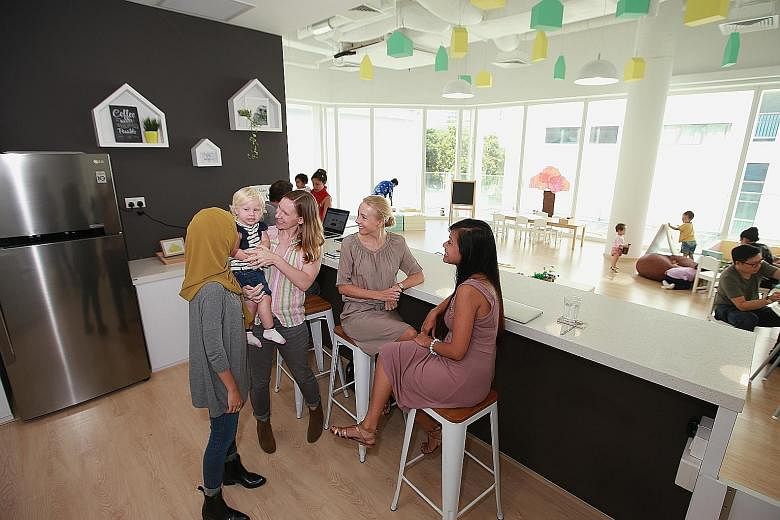The growth of co-working spaces has boosted the office and retail market and created new opportunities for landlords, say property watchers.
The rise of the gig economy is one factor feeding demand for such spaces, according to Ms Susan Sutherland, head of corporate solutions research for JLL Asia-Pacific.
Edmund Tie & Company head of research Lee Nai Jia noted late last month that this new way of working has helped to lift office occupancy and rents.
Rents ticked up by 2.4 per cent in the third quarter compared with the previous three months, Urban Redevelopment Authority data showed - a turnaround from the 1.1 per cent decline in the second quarter.
Dr Lee told The Straits Times: "We saw the co-working operators taking up much space in the newly completed buildings in 2017."
He pointed to home-grown JustCo's two-floor occupancy at the UIC building in Shenton Way, as well as Hong Kong-based The Work Project's use of the entire fourth floor at OUE Downtown next door.
"Also, WeWork will operate in Beach Centre, which just completed its A&A (addition and alteration) works last year," Dr Lee added, referring to the arrival of the global co-working giant in Singapore.
JustCo founder and chief executive Kong Wan Sing told ST: "More and more businesses shy away from the long tenancy and the hassle to fit out the space from renting with traditional landlords. This has disrupted the ecosystem in the office property scene."
He noted that shopping centres are now trying to present themselves as community hubs that sell experiences and not just products.
"Co-working space is becoming a prevalent option for vacant retail malls," said Mr Kong.
Indeed, the message seems to be: If you can't beat them, join them.
JLL Singapore head of consulting Chin Peidi told ST that more landlords are expected to jump on the bandwagon: "They could actively seek to include co-working spaces within their portfolio by partnering operators or even set up their own co-working spaces.
"The winners would be the landlords that are able to capitalise on the trend to drive occupancy and footfall to their developments."
One such shopping centre is Katong Point, where anchor tenant and creative co-working space Mox opened its doors last month, complete with amenities such as 3D printers and industrial-grade sewing machines.
The facility is a $1 million joint venture between retail and events management firm Invade and mall owner Buxani Group.
Mr Kishore Buxani, the property group's chief executive, said: "Over the last few years, the retail landscape in Singapore has deteriorated quickly and smaller traditional retail malls were becoming irrelevant, with e-commerce and disruptive technologies.
"As a result, I realised that I had to be one step ahead and create something unique."
JLL's Ms Chin added that with more players arriving on the scene, including from abroad, competition will heat up for co-working spaces.
"Providers need to know their target members and tailor the product accordingly," she said.


